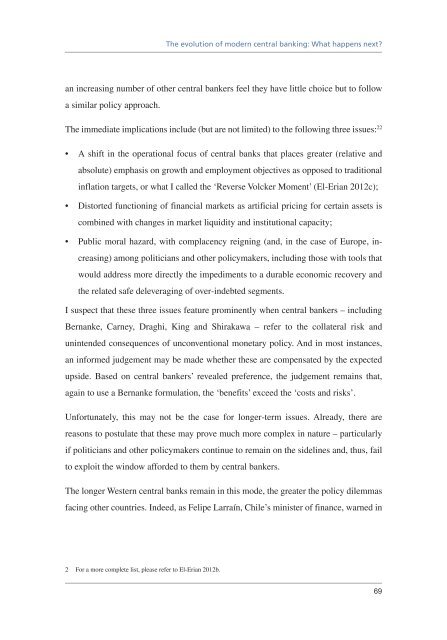Is inflation targeting dead? Central Banking After the Crisis - Vox
Is inflation targeting dead? Central Banking After the Crisis - Vox
Is inflation targeting dead? Central Banking After the Crisis - Vox
You also want an ePaper? Increase the reach of your titles
YUMPU automatically turns print PDFs into web optimized ePapers that Google loves.
The evolution of modern central banking: What happens next?an increasing number of o<strong>the</strong>r central bankers feel <strong>the</strong>y have little choice but to followa similar policy approach.The immediate implications include (but are not limited) to <strong>the</strong> following three issues: 22• A shift in <strong>the</strong> operational focus of central banks that places greater (relative andabsolute) emphasis on growth and employment objectives as opposed to traditional<strong>inflation</strong> targets, or what I called <strong>the</strong> ‘Reverse Volcker Moment’ (El-Erian 2012c);• Distorted functioning of financial markets as artificial pricing for certain assets iscombined with changes in market liquidity and institutional capacity;• Public moral hazard, with complacency reigning (and, in <strong>the</strong> case of Europe, increasing)among politicians and o<strong>the</strong>r policymakers, including those with tools thatwould address more directly <strong>the</strong> impediments to a durable economic recovery and<strong>the</strong> related safe deleveraging of over-indebted segments.I suspect that <strong>the</strong>se three issues feature prominently when central bankers – includingBernanke, Carney, Draghi, King and Shirakawa – refer to <strong>the</strong> collateral risk andunintended consequences of unconventional monetary policy. And in most instances,an informed judgement may be made whe<strong>the</strong>r <strong>the</strong>se are compensated by <strong>the</strong> expectedupside. Based on central bankers’ revealed preference, <strong>the</strong> judgement remains that,again to use a Bernanke formulation, <strong>the</strong> ‘benefits’ exceed <strong>the</strong> ‘costs and risks’.Unfortunately, this may not be <strong>the</strong> case for longer-term issues. Already, <strong>the</strong>re arereasons to postulate that <strong>the</strong>se may prove much more complex in nature – particularlyif politicians and o<strong>the</strong>r policymakers continue to remain on <strong>the</strong> sidelines and, thus, failto exploit <strong>the</strong> window afforded to <strong>the</strong>m by central bankers.The longer Western central banks remain in this mode, <strong>the</strong> greater <strong>the</strong> policy dilemmasfacing o<strong>the</strong>r countries. Indeed, as Felipe Larraín, Chile’s minister of finance, warned in2 For a more complete list, please refer to El-Erian 2012b.69














